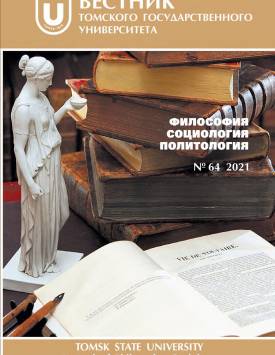Methodology of Discourse Analysis of Political Judgments on Platforms of Regional Problems
The development of a methodology for text analysis on information and communication platforms and social networks is becoming an urgent need not only for modern social and human sciences, but also for the practical field of empirical research. Discourse analysis, as opposed to content analysis, involves not only frequency calculation of words in their context, but also contextual analysis of speech acts as a whole, taking into account their structural features. At present, there is no uniform methodology for discourse analysis. Different schools choose a different object of analysis when using this method. The School of Continental Europe focuses on the analysis of written texts, the Anglo-Saxon School on the analysis of oral speech and discourse. The first attempt to conduct a discourse analysis of written speech in social networks was made by the Russian researcher Yu.G. Misnikov. I continue to develop the methodology of discourse analysis in its application to the digital sphere. The aim of this article is to develop a new approach to discourse analysis of small texts and deliberations in the form of judgments placed on digital platforms of communication with regional authorities, as well as in social networks related to these platforms. The methods of structural and functional analysis, discourse analysis, and general scientific methods of analysis and synthesis have been used in writing this article. The working hypothesis of my project is the statement that, on modern Russian platforms of communication with the authorities, the information type of judgments based on the interaction of the “stimulus-reaction” kind prevails. The development of the toolkit implies reference to the existing methods of conducting discourse analysis, selection of a conceptual framework for substantive justification of the new methodology of discourse analysis, preparation of the toolkit based on it and its subsequent testing on the basis of judgments posted on the digital platform of communication with regional authorities. The conceptual framework for the discourse analysis toolkit became the concept of lay epistemics by American social psychologist A. Kruglanski and the parameters his research team and he used in the parametric model of social judgment.
Keywords
political judgments, platforms of regional problems, A. Kruglanski, lay epistemics, discourse analysisAuthors
| Name | Organization | |
| Ignatjeva Olga A. | Saint Petersburg State University | olga7919@mail.ru |
References

Methodology of Discourse Analysis of Political Judgments on Platforms of Regional Problems | Tomsk State University Journal of Philosophy, Sociology and Political Science. 2021. № 64. DOI: 10.17223/1998863X/64/18
